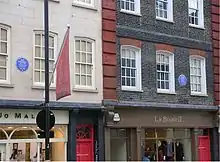.jpg.webp)
Brook Street is an axial street in the exclusive central London district of Mayfair. Most of it is leasehold, paying ground rent to and seeking lease renewals from the reversioner, that since before 1800, has been the Grosvenor Estate. Named after the Tyburn that it crossed,[1] it was developed in the first half of the 18th century and runs from Hanover Square to Grosvenor Square. The western continuation (to Park Lane) is called Upper Brook Street; its west end faces Brook Street Gate of Hyde Park. Both sections consisted of neo-classical terraced houses, mostly built to individual designs. Some of them were very ornate, finely stuccoed and tall-ceilinged, designed by well known architects for wealthy tenants, especially near Grosvenor Square, others exposed good quality brickwork or bore fewer expensive window openings and embellishments. Some of both types survive. Others have been replaced by buildings from later periods.
Opulent hotel Claridge's co-fronts two other streets[lower-alpha 1] and takes the majority of a block. The Embassy of Argentina is at No. 65. The Handel & Hendrix in London occupies Nos. 23–25, once homes of famous musicians Jimi Hendrix and Handel. The baroque chamber music ensemble The Brook Street Band takes its name from No. 25 where Handel lived from 1723 to 1759.
The French restaurant Le Gavroche is housed on the primary floors of No.43 Upper Brook Street.
Former residents
Sursock family
The Sursock family opened their first office in Europe, at No. 31, in 1858, from which they directed commercial networks, exposing land-holdings across the eastern Mediterranean to development capital of European markets (of joint-stock equity and of credit).[2]
Others

- Brook Street
- 20: Gerard Vandergucht, engraver and art dealer. His son, Benjamin Vandergucht, was born here in 1753.[3]
- 23: Jimi Hendrix, guitarist
- 25: George Frideric Handel, composer
- 39: Sir Jeffry Wyatville, architect
- 39: Sibyl, Lady Colefax and John Fowler, interior decorator and interior designer
- 54: Valentine Ackland, poet, was born here.[4]
- 67: Barry, Robin, and Maurice Gibb, musicians, better known as the Bee Gees
- 72: Sir Henry Holland, physician and travel writer, lived and died here.[3]
- 74: Sir William Gull, Royal physician
- 74: Robert Bentley Todd, physician
- 76: Colen Campbell, architect
- 78: Ronald Firbank, novelist[lower-alpha 2]
- Upper Brook Street
- 1: Charles Algernon Parsons, Anglo-Irish engineer and inventor of the compound steam turbine
- 3: Sir Lucas Pepys, physician to King George III and Jane Elizabeth Leslie, 12th Countess of Rothes[3]
- 4: Piero Malacrida de Saint-August, Nadja Malacrida,[5] and Sir Thomas Fuller-Elliott-Drake.
- 18: Anne Seymour Damer, sculptor, died here, 1828.[3]
- 22: Leo Bonn, founder of what became the Royal National Institute for Deaf People
- 24: Richard Bull, MP and art collector (1755–74), Sydney Ernest Kennedy, stockbroker and art collector (1891–1921)[6]
- 27: William Gerard Hamilton, statesman, died here, 1796.[3]
- 28: Topham Beauclerk, wit, lived here as a young child, 1745 to 1753.[7]
- 35: William Jowitt, 1st Earl Jowitt, lawyer and politician (the interior received mosaics by Boris Anrep in 1923).
- 40: Edward Hughes Ball Hughes, Regency dandy[1][lower-alpha 3]
- 51: Giorgos Seferis, Greek Ambassador, poet and Nobel laureate
- 56: David Ricardo, economist
Notes and references
- Footnotes
- Citations
- 1 2 Survey of London, Volume 40: The Grosvenor Estate in Mayfair, Part 2 (The Buildings), 1980, ed. F. H. W. Sheppard, p. 210-221
- ↑ Alff, Kristen (January 2018). "Levantine Joint-Stock Companies, Trans-Mediterranean Partnerships, and Nineteenth-Century Capitalist Development". Comparative Studies in Society and History. 60: 150–177. doi:10.1017/S0010417517000445.
- 1 2 3 4 5 Wheatley, Henry Benjamin; Cunningham, Peter (24 February 2011). London Past and Present: Its History, Associations, and Traditions. Cambridge University Press. p. 283. ISBN 978-1-108-02806-6.
- ↑ Brown, Susan, Patricia Clements, and Isobel Grundy, eds. Valentine Ackland entry: Life screen within Orlando: Women's Writing in the British Isles from the Beginnings to the Present. Cambridge: Cambridge University Press Online, 2006. http://orlando.cambridge.org/. 27 November 2018.
- ↑ "Upper Brook Street: North Side Pages 200-210 Survey of London: Volume 40, the Grosvenor Estate in Mayfair, Part 2 (The Buildings). Originally published by London County Council, London, 1980". British History Online. Retrieved 12 July 2020.
- ↑ 'Upper Brook Street: North Side', in Survey of London: Volume 40, the Grosvenor Estate in Mayfair, Part 2 (The Buildings), ed. F H W Sheppard (London, 1980), pp. 200-210 http://www.british-history.ac.uk/survey-london/vol40/pt2/pp200-210 Accessed 14 December 2015
- ↑ Noy, David (2016). Dr. Johnson's friend and Robert Adam's client Topham Beauclerk. Newcastle upon Tyne, UK. p. 11. ISBN 978-1-4438-9325-1. OCLC 949668955.
{{cite book}}: CS1 maint: location missing publisher (link)
External links
- Brook Street – detailed architectural history of Brook Street from the Survey of London
- Upper Brook Street – detailed architectural history of Upper Brook Street from the Survey of London
- Brook Street, London at Curlie